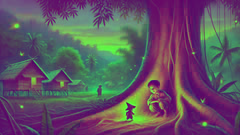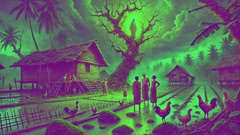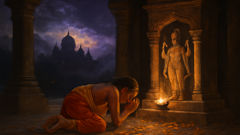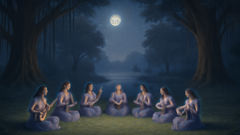Introduction
In the heart of the Philippine archipelago lies a village that’s neither marked on maps nor spoken of in tourist guides, a place where the air is thick with the scent of ripe mangoes and the laughter of children echoes between bamboo houses. Here, stories aren’t just told—they are lived. The boundaries between the real and the mystical are as thin as the morning mist that clings to the rice paddies at dawn. Every family has its tales, and every corner hides a secret. At the edge of this village, under a sprawling mango tree older than the oldest grandparent, a legend pulses quietly beneath the roots: the legend of the duwende. Some say the duwende are mischievous, bringing misfortune to those who disrespect their home; others whisper of their kindness, bestowing luck on those who honor the old ways. For generations, villagers have left gifts of rice, sugar, and coins at the base of trees, careful not to disturb ant hills or mossy stones. Children are warned not to play after sundown or to point their fingers at shadows, lest they draw the attention of these unseen dwellers. To the outsider, it might seem mere superstition, but for those who’ve lived here all their lives, the duwende are as real as the monsoon rains and the chorus of cicadas at dusk. This is where our story begins, with a young boy named Miguel, whose curiosity will lead him—and his entire village—into the heart of a legend that’s as old as the land itself.
Beneath the Mango Tree: The First Encounter
Miguel was eleven the summer his life changed forever. Like most boys in his village, he was restless, always chasing dragonflies or climbing guava trees for their tart, green fruit. But what set Miguel apart was his insatiable curiosity—an itch that drove him to question every story his Lola Rosa told at night, especially those about the duwende. His grandmother’s tales were more than entertainment; they were warnings wrapped in the warmth of bedtime, reminders that not everything in their world could be seen or explained.

One particularly sweltering afternoon, the kind when the sun bakes the clay paths and every living creature seeks shade, Miguel found himself drawn to the ancient mango tree at the village’s edge. It was a tree revered and feared in equal measure. The elders said it was enchanted, home to spirits and duwende who’d lived there longer than any human memory. No one dared climb it or pick its fruit without asking permission aloud. That day, a flock of maya birds scattered from its branches as Miguel approached, their wings flashing in the sunlight. He paused, recalling his grandmother’s advice: always greet the tree and never step on the roots. He bowed respectfully, feeling a little foolish, then tiptoed around a mound of earth that looked suspiciously like a duwende’s door.
As Miguel circled the trunk, he noticed something strange: a faint, silvery light pulsing from beneath the roots. He crouched low, brushing aside dead leaves. The earth seemed to breathe beneath his fingertips, and a cool breeze—odd for such a hot day—rustled the hair on his arms. Suddenly, he heard a whisper, so soft it might’ve been imagined. But it was there: a wordless hum, like the distant song of bamboo wind chimes. Startled yet entranced, Miguel peered closer. For an instant, he glimpsed movement—a tiny figure darting behind a pebble, wearing what looked like a pointed red cap. Miguel’s heart hammered in his chest. The stories were real.
He scrambled backward, nearly tripping over his own feet, and fled home. That evening, he told his Lola Rosa what he’d seen. Her face grew grave, lines etching deeper around her eyes. She set a small plate of suman and a thimble of sugar at the doorstep, whispering a prayer of apology to the unseen. “You must always show respect, anak,” she said. “The duwende can bless you or curse you. It depends on your heart.”
That night, Miguel lay awake, the image of the duwende burned into his mind. He wondered what would’ve happened if he’d spoken to it, or if he’d dared to linger longer. The next morning, he found his favorite slingshot missing and his school uniform splattered with mud—mischief, surely, from offended spirits. The whole village buzzed with talk. Some blamed Miguel for waking the duwende, warning that their luck would sour if he didn’t make amends. Others, secretly thrilled, treated him with newfound awe.
Miguel’s curiosity, however, was not dampened. Over the next weeks, he returned to the mango tree, this time with offerings—a handful of rice, a piece of ripe banana, even a small toy truck. Each time, he’d whisper a greeting, closing his eyes and willing himself to feel the presence beneath the roots. Sometimes, he’d catch fleeting glimpses: a shadow here, a glimmer there. Other times, he’d find little gifts left for him in return—a perfect shell, a polished stone, a tiny wooden flute.
The relationship grew—a silent, tentative friendship between boy and duwende. Miguel became careful not to trample ant hills or pick flowers without permission. He noticed the subtle changes in his home: his father’s crops flourished despite the drought, his mother’s cough faded, and coins appeared mysteriously in forgotten pockets. The villagers, too, began to talk. Was it luck? Or was it the duwende’s doing?
But with every blessing comes a challenge. One evening, a traveling merchant arrived, offering to buy the mango tree’s fruit for a high price. The promise of wealth tempted some villagers, who began discussing plans to cut back branches and harvest more aggressively. Miguel’s pleas fell on deaf ears. That night, a strange wind howled through the village, carrying with it the unmistakable sense of foreboding.
The next morning, the river overflowed its banks, flooding fields and homes. Chickens vanished, and prized carabaos broke loose from their pens. Panic spread—had the duwende been angered? The elders called for a gathering beneath the mango tree. Miguel, trembling but resolute, confessed his role in awakening the spirits and begged for forgiveness on behalf of the village.
Together, they prepared a grand offering: woven baskets of rice, sweet kakanin, and garlands of sampaguita. Children sang lullabies, and elders recited ancient prayers. The atmosphere was thick with hope and fear, each villager silently pleading for mercy and fortune. As the sun set, the silvery light beneath the tree brightened, and a gentle breeze swept away the lingering dread. It was said that night, if you listened closely, you could hear laughter—tiny, joyful peals that promised the duwende’s forgiveness.
From that day, Miguel was changed. He became the unofficial guardian of the mango tree, teaching younger children to honor the land and its unseen dwellers. The village, too, learned to live in harmony with the duwende, careful not to disturb their delicate peace. Fortune returned—crops grew, illnesses faded, and families thrived. And always, beneath the ancient mango tree, the whispers of the duwende lingered, weaving magic and wisdom into the fabric of everyday life.
The Price of Disrespect: Trials of Luck and Misfortune
Despite the reconciliation with the duwende, harmony in the village was fragile. Old habits die hard, and greed is a persistent weed. The memory of the merchant’s tempting offer lingered in the minds of some villagers. One by one, they grew bolder—picking more fruit than needed, digging too close to the roots, dismissing the old superstitions as mere stories for children. Miguel watched with worry as respect for the duwende faded into the background noise of daily life.

Trouble soon followed. It began with small inconveniences: tools vanished, chickens laid fewer eggs, and children woke with tangled hair and unexplained bruises. The villagers laughed these off at first, but when a prized harvest was ruined overnight—mangoes rotting on the branches, fields flooded without rain—the laughter died. Fear returned, heavier than before.
Miguel’s own family wasn’t spared. His father’s once-thriving vegetable patch withered, and his mother’s prized sewing needle—a family heirloom—disappeared. The sense of unease grew. Some villagers pointed fingers at Miguel, muttering that he’d angered the duwende anew. Others begged him to intercede, thrusting offerings into his hands as if he were a shaman or a priest.
Determined to restore balance, Miguel sought wisdom from Lola Rosa. She guided him in preparing a proper atang—a ritual offering for peace and forgiveness. Together, they selected the choicest fruits, sticky rice, a bit of tobacco, and even a thimble of homemade lambanog. At sunset, they knelt beneath the mango tree, whispering apologies and promises of respect.
That night, Miguel dreamt vividly. He wandered through an underground realm of twisting roots and sparkling stones. The duwende appeared before him—not as menacing goblins but as dignified, wise beings clothed in vibrant silks and woven hats. Their leader, an elder duwende with a beard like silver moss, spoke in a voice both ancient and kind.
“You have shown respect when others forgot,” he said. “But wisdom must be shared, not guarded. Teach your village the old ways—not out of fear, but out of love for the land.”
Miguel awoke with a start. He shared his dream with Lola Rosa, who nodded knowingly. The next day, he gathered the children under the mango tree and began teaching them about the traditions of respect: never pointing at shadows, always asking permission before picking fruit or digging, offering thanks for every harvest. The children listened with wide eyes and eager hearts. Soon, their parents joined in, curious to see what held their children’s attention so completely.
Slowly, the village changed. They planted new trees, repaired old shrines, and held annual festivals honoring both the visible and invisible guardians of their land. Luck returned in small but significant ways—a lost necklace found in an empty basket, an unexpected rain ending a long dry spell, a sick child recovering overnight. Even the most skeptical villagers began to believe.
Yet there remained a lesson for Miguel himself. One evening, while exploring the forest’s edge in search of wild orchids, he grew careless—climbing over rocks and plucking flowers without a second thought. A sharp pain lanced his foot, and he tumbled down a slope, landing in a patch of thorny vines. Dizzy and scared, Miguel called for help but heard only the wind in the trees.
As darkness fell, a gentle glow flickered nearby. The duwende emerged from the undergrowth, their tiny faces etched with concern and disapproval. They tended his wounds with leaves and whispered words that soothed his fear. Their leader spoke again: “Even those who teach must remember to listen. Respect is a living thing—it must be renewed each day.”
When dawn broke, Miguel found himself at the forest’s edge, his foot bandaged with fragrant herbs. He limped home, carrying not just the pain of his injury but a deepened understanding of humility and gratitude. From then on, he became not just a storyteller but a living example of the lessons he shared.
The village thrived once more—not because they feared misfortune but because they cherished the delicate balance between seen and unseen, tradition and change. The duwende remained ever-present—sometimes playful, sometimes stern—but always watching, always waiting for the next lesson to be learned beneath the ancient mango tree.
Conclusion
Years passed, and Miguel grew into a man respected by all. The mango tree at the village’s edge stood even taller, its branches laden with golden fruit and its roots encircled by little altars of gratitude. Children still played beneath its shade, but always with whispered greetings and careful steps. The legend of the duwende became more than a tale to frighten the disobedient; it became a living reminder of the harmony possible between humanity and the spirits of nature. Miguel’s story was woven into every festival song and every lullaby sung at night. Even those who left the village for distant cities carried with them a small offering—a coin, a flower, a prayer for luck—lest the duwende be forgotten. For in respecting what is unseen, they had found not just fortune, but wisdom: that every life is bound to the land and to those who came before. And as long as the mango tree stood, its roots alive with secrets and its branches stretching toward the sky, the duwende would watch over the village—mischievous, mysterious, and forever part of its soul.













